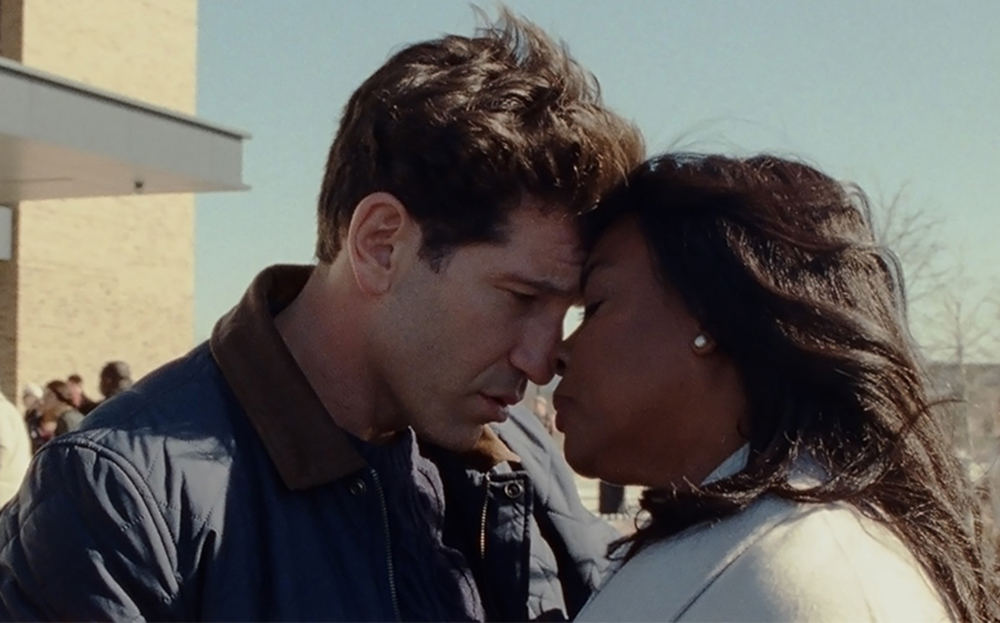“I want to be in the story, really inside and that takes time,” Isabel Wilkerson (Aunjanue Ellis-Taylor) tells a magazine editor (Blair Underwood) when she’s approached with an assignment to cover the Travon Martin case in “Origin,” politely declining his advances in spite of learning more horrific details surrounding the tragic murder of the 17-year-old from Florida than the public has caught wind of. There’s agreement that Martin will become national news, though at what scale neither can likely fathom quite yet, and Wilkerson passing on the opportunity isn’t the type of gesture that’s usually celebrated, but writer/director Ava DuVernay understands how it’s necessary when giving time over to individual investigations, no matter how compelling, can get in the way of larger interrogations.
Many people seeing “Origin” will likely know the larger project that Wilkerson didn’t want to be distracted from when the film is partially an adaptation of the Pulitzer Prize-winning journalist’s “Caste: The Origin of Our Discontents,” a rigorous dissection of hierarchies that govern American society that outlined more ambiguous machinery behind oppression than typically identified root causes such as race, religion and gender. But what is less obvious from DuVernay’s brilliant take on the dense tome, which hardly lent itself to serve as the basis for a narrative drama when looking towards the tortured pasts of India and Germany to form its thesis, is how the filmmaker’s own experience has surely supplied the passion necessary to lift it off the page to become a transcendent story of perseverance when Wilkerson is thrust into serving as the film’s emotional center beyond her original role as its intellectual core, deciding what’s important for her to pursue in the wake of the unexpected and sudden death of her husband (Jon Bernthal).
Although the book’s author is placed front and center as the film’s driving narrative force, traveling around the world for a greater understanding of what allows for systemic injustice to occur, so too is the film’s auteur when it’s hard not to see in its lead character more than a bit of DuVernay, an artist whose professional achievements have placed her in the lofty rooms where decisions are made and surely has to question herself about what’s within her power to determine what can be achieved. There’s a slightly eerie quality to scenes where Wilkerson mingles at high society galas with titans of industry as someone who clearly gets all the invites but nonetheless has a vaguely nagging feeling she’ll always be an outsider — the warmth of a family BBQ with relatives playing Uno and dancing makes for a sharp contrast — and when DuVernay’s shrewd mentality as an executive has been to create change through an accumulation of small but meaningful tweaks to standard practices such as using the platform of her landmark series “Queen Sugar” to provide legions of female filmmakers with their first TV job that inevitably lead to others and directing pilots herself for genre series such as “Naomi” and “DMZ” to diversify a vision of the future, her triumphant return to the big screen after a five-year absence finds that idea informing “Origin”’s narrative structure when Wilkerson tests her thesis in a series of conversations in which she is challenged as much as she’s putting forth ideas.
For those who have been hoping for DuVernay to return to the intimacy of her early films “I Will Follow” and “Middle of Nowhere” where spare rooms could feel like the whole world, “Origin” beautifully balances the raw emotion that she’s been able to elicit from the start of her career with the larger notions of connectivity she’s prized more recently as Wilkerson is gradually opened up simply by talking to other people, with the grandeur added by a three-continent shoot and the major epiphanies that start to take shape in Wilkerson’s head, all expressed with considerable nuance in a radiant turn from Ellis. (Mighty supporting turns from Niecy Nash-Betts and Audra McDonald give an instant weight as well.) Wilkerson’s quest to go further with her research on a book with far-ranging implications on shaping cultural consciousness is pushed by a search inward that’s just as difficult as personal losses mount in her own life and given what the author endures, the history of imposing even more obstacles onto an experience where too damn many naturally occur outside our control truly hits home. Wilkerson is right to say it takes time to get inside a story, as DuVernay clearly has, and by its end, “Origin” won’t leave you.
“Origin” will be released later this year by NEON.




